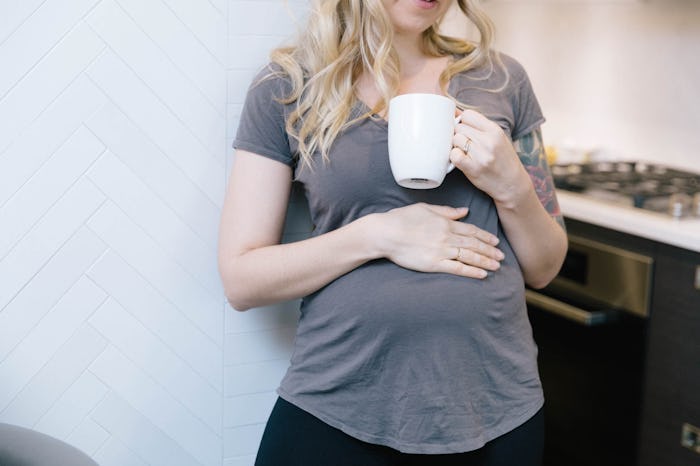I run on coffee. I drink so much coffee, in fact, that I think it's actually become my blood type. (AB for Arabica Beans.) When I was pregnant, reducing my coffee intake was harder than nixing wine, sushi, or soft cheese, and I know I'm not alone. So what does it mean when you crave Starbucks while pregnant? Are you, too, experiencing dreams of gigantic lattes floating you away to sweet, sweet caffeine oblivion on a cloud of whipped cream?
Most cravings, especially those during pregnancy, are completely unrelated to any cues your body may be giving you about its needs or deficiencies, according to Frontiers in Psychology. Instead, they're based in your psyche. You're told that pregnant women are supposed to experience cravings, and so your brain tells you, "Hey, remember that chocolate bar you had that one time from that one place? You want that. You want that so bad." The pregnant brain is being guided by an internalized set of cues that began being implanted from the first time it heard the rumor of pregnant women who craved pickles and ice cream. While this is not the case with Pica, which is the craving for things you definitely shouldn't eat, like chalk or laundry soap, and is actually linked to an iron deficiency, when it comes to most cravings, there's no correlation with what your body wants and what it actually needs.
But is coffee different? What does it mean when you crave Starbucks while pregnant?
Coffee is addictive, believe you me. Withdrawal can give you migraines, shakes, sleep disturbances, irritability (and I was not a nice pregnant lady to begin with) and depression, according to George Washington University. The symptoms can linger for months or even years. In their book Psychology, Don and Sandra Hockenburys, PhDs, noted that just the smell of coffee, long after you've given it up, can make you want it because it becomes a conditioned response for your body.
That craving you have for a triple mocha Frappuccino with extra whip is likely a genuine withdrawal craving. You can experience these cravings even if you're still indulging in a morning cup or two, because the need for caffeine, which is a drug, increases as regular consumption increases, according to NPR.
While Dr. Sears noted in Parenting that the rules against caffeine during pregnancy may be overly-restrictive, in general, he mentioned that it's good to be less dependent upon a drug than more. You may be able to lessen the withdrawal symptoms by simple actions like brewing with part-decaf grounds, or substitute with healthy alternatives like water, which may ameliorate the worst effects like headaches and grogginess.
Know that your cravings for Starbucks are very real, and that you can improve them over time — unless it's not the coffee, but the cake pops you're craving. At that point, it's all just mind over matter. (But those pink ones are delicious.)
